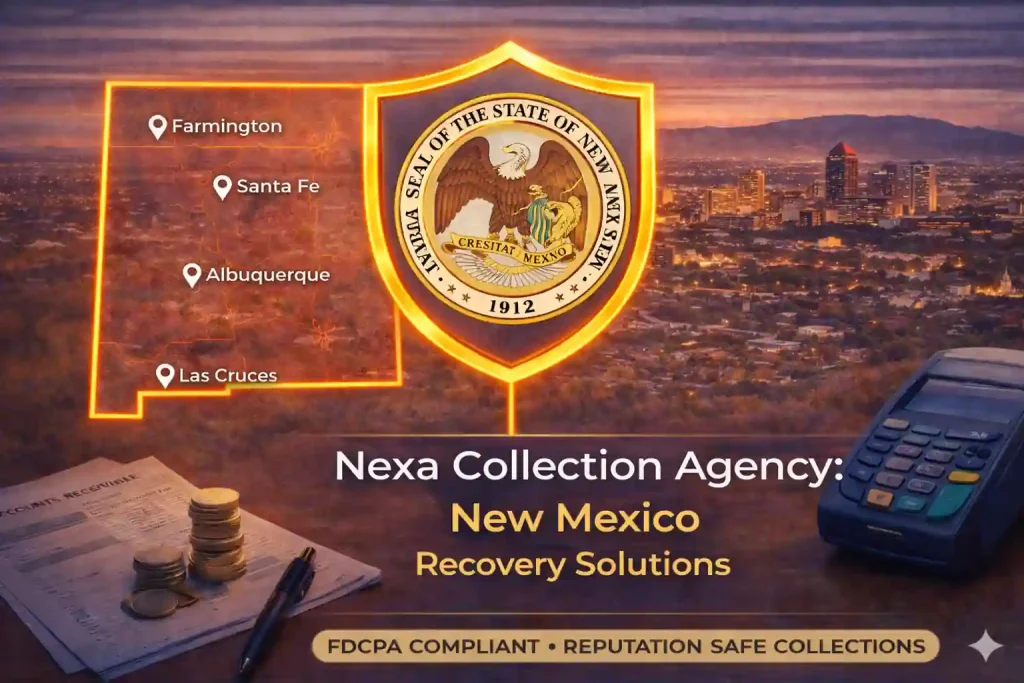In New Mexico—from the high-tech corridors of Rio Rancho and the financial hubs of Albuquerque to the medical centers of Santa Fe and the agricultural roots of the Mesilla Valley—trust is everything. But in 2026, “doing business” means navigating one of the most complex regulatory landscapes in the West. With the Patients’ Debt Collection Protection Act in full effect and minimum wages varying from $12.00 to over $13.00 across the state, your revenue cycle needs more than a collector; it needs a local strategist. Nexa provides the “Cuentas Claras” (Clear Accounts) approach, ensuring you recover what is yours without violating the state’s aggressive consumer protections.
Nexa provides 100% reputation-safe, equipped with all 50-state collections license, offering free credit reporting, free litigation/bankruptcy scrubs, and zero onboarding fees. Secure – SOC 2 Type II & HIPAA compliant.
Need a Collection Agency? Contact us
The New Mexico Legal Landscape (2026 Summary)
New Mexico rewards creditors who use written contracts, but the clock moves fast on open medical accounts.
| Debt Category | Statute of Limitations | NM Statute (NMSA) |
| Written Contracts | 6 Years | NMSA § 37-1-3 |
| Oral / Open Accounts | 4 Years | NMSA § 37-1-4 |
| Medical Debt | 4 Years | SB 71 Screening Rules |
| Wage Garnishment | 25% Cap (High Floor) | NMSA § 35-12-7 |
| Judgments | 14 Years (Renewable) | NMSA § 37-1-2 |
Critical New Mexico Rules for 2026:
-
The “Indigent” Shield: Under the Patients’ Debt Collection Protection Act, you are prohibited from collecting from patients earning below 200% of the Federal Poverty Level. Nexa handles the mandatory screening process, ensuring you only pursue accounts that are legally collectable.
-
The $12.00 – $13.01 Wage Floor: While the state minimum wage is $12.00, cities like Las Cruces have hit $13.01 in 2026. We perform “Garnishment Math” to ensure your legal spend is targeted at high-earners who exceed the state-protected weekly income floor (~$480/week).
-
Bilingual Mediation: With over 49% of the population identifying as Hispanic, our bilingual recovery team is essential for effective, respectful mediation that preserves your reputation in the community.
-
Construction Liens: New Mexico has strict timelines for Mechanic’s Liens (NMSA § 48-2-6). You have only 90 days (for contractors) or 120 days (for owners) to file. Nexa triggers payment before these critical windows close.
Cost-Effectiveness: The Nexa Advantage
-
Fixed-Fee Recovery ($15/account): Best for high-volume, early-stage debt. Debtors pay 100% directly to you. No commissions.
-
Contingency Service (20%–40%): Performance-based recovery. No Recovery, No Fee.
Industries We Serve in New Mexico
-
Healthcare & Medical: 100% HIPAA-compliant. We specialize in the Patient Protection Act, navigating indigency screening for hospitals and clinics from Albuquerque to Las Cruces while protecting your reputation.
-
Technology & Manufacturing: B2B recovery for the Intel and aerospace corridors in Rio Rancho and Southern New Mexico. We handle high-value logistics and supply chain disputes.
-
Agriculture & Logistics: Serving the Chili and Pecan sectors of the Mesilla Valley. We understand the seasonal cash flow of New Mexico’s ag-business and the “Crossroads” logistics of I-25/I-40.
-
Colleges & Universities: From UNM to NMSU, we handle tuition fee recovery and housing balances with a focus on student relationships and alumni rapport.
-
Accountants & CPA Firms: Recovery of professional service fees. We understand the local tax cycles and use professional mediation to ensure you get paid without damaging client rapport.
-
Banks & Credit Unions: Expert handling of delinquent consumer loans and deficiency balances using New Mexico’s 14-year judgment window.
-
Construction & Trades: Revenue recovery for HVAC, electrical, and general contractors. We are experts in NMSA Chapter 48 Mechanic’s Liens and strict filing deadlines.
-
B2B Commercial, Restoration & Waste Management: High-speed recovery for service providers who need cash flow restored to manage rising labor and equipment costs.
Recent New Mexico Recovery Results
Case 1: Albuquerque Regional Health Group (Medical)
-
The Problem: $125,000 in aging patient debt. The clinic was terrified of the new SB 71 screening requirements.
-
The Result: Nexa implemented a compliant screening and “Notice of Rights” strategy, recovering $84,000 in 60 days from non-indigent patients while protecting the clinic from legal liability.
Case 2: Rio Rancho Tech Supplier (B2B)
-
The Problem: A $48,000 unpaid logistics invoice from a vendor who stopped responding during a facility relocation.
-
The Result: Utilizing the 6-year written contract statute and a formal pre-legal demand, Nexa secured a full $48,000 recovery plus interest in just 22 days.
Frequently Asked Questions (FAQ)
1. Is it true I can’t collect from low-income patients in New Mexico?
If a patient makes less than 200% of the Federal Poverty Level, certain collection actions are prohibited. Nexa provides the “Attestation of Indigency” screening to ensure your collections are 100% compliant.
2. How long do I have to sue for a debt in New Mexico?
For written contracts, you have 6 years. For oral agreements or open “store accounts,” you have 4 years. Act early, as evidence ages faster than the law.
3. Does Nexa handle credit reporting?
Yes. For all eligible accounts (excluding medical debt under $500 or indigent medical accounts), we report to all major bureaus to provide maximum leverage.
Popular Cities:

